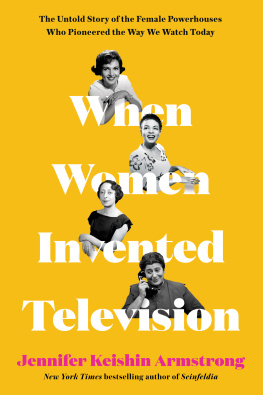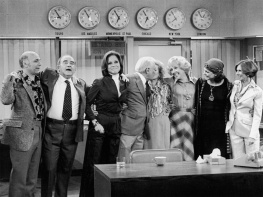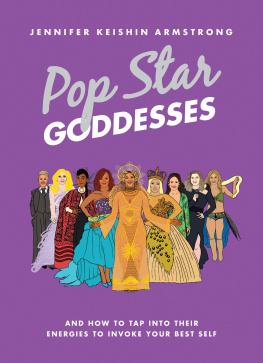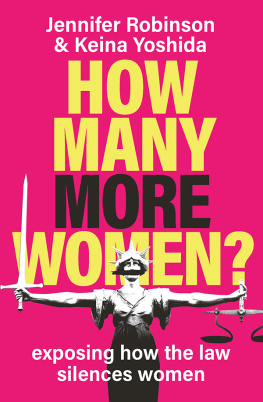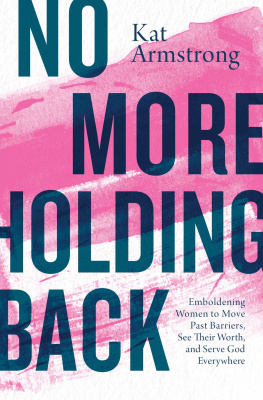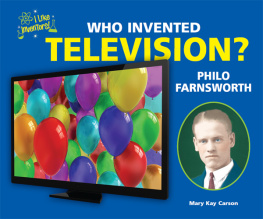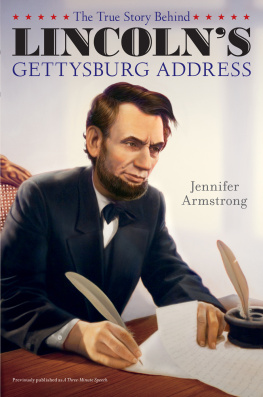Jennifer Keishin Armstrong - When Women Invented Television
Here you can read online Jennifer Keishin Armstrong - When Women Invented Television full text of the book (entire story) in english for free. Download pdf and epub, get meaning, cover and reviews about this ebook. year: 2021, publisher: HarperCollinsPublishers, genre: Non-fiction. Description of the work, (preface) as well as reviews are available. Best literature library LitArk.com created for fans of good reading and offers a wide selection of genres:
Romance novel
Science fiction
Adventure
Detective
Science
History
Home and family
Prose
Art
Politics
Computer
Non-fiction
Religion
Business
Children
Humor
Choose a favorite category and find really read worthwhile books. Enjoy immersion in the world of imagination, feel the emotions of the characters or learn something new for yourself, make an fascinating discovery.
- Book:When Women Invented Television
- Author:
- Publisher:HarperCollinsPublishers
- Genre:
- Year:2021
- Rating:4 / 5
- Favourites:Add to favourites
- Your mark:
- 80
- 1
- 2
- 3
- 4
- 5
When Women Invented Television: summary, description and annotation
We offer to read an annotation, description, summary or preface (depends on what the author of the book "When Women Invented Television" wrote himself). If you haven't found the necessary information about the book — write in the comments, we will try to find it.
Jennifer Keishin Armstrong: author's other books
Who wrote When Women Invented Television? Find out the surname, the name of the author of the book and a list of all author's works by series.
When Women Invented Television — read online for free the complete book (whole text) full work
Below is the text of the book, divided by pages. System saving the place of the last page read, allows you to conveniently read the book "When Women Invented Television" online for free, without having to search again every time where you left off. Put a bookmark, and you can go to the page where you finished reading at any time.
Font size:
Interval:
Bookmark:
| ACTRESS TALLULAH BANKHEAD : | Radio is the mother of television. |
| INTERVIEWER : | Who is the father? |
| BANKHEAD: | TV has no father. |
I tell these womens stories as informed by interviews with surviving witnesses to the era and the womens descendants, as well as by archival documents, press clippings, and archived interviews. I re-create narrative scenes using all of those sources. Ive indicated within the text, when necessary, where the accounts come from. I checked scenes using multiple sources when possible; dialogue comes from accounts of those who were present. Full notes on specific sources are available at the end of the book.
JENNIFER KEISHIN ARMSTRONG is the New York Times bestselling author of Seinfeldia; Mary and Lou and Rhoda and Ted; and Sex and the City and Us. She worked at Entertainment Weekly for a decade and has written for many publications, including BBC Culture, the New York Times Book Review, Vice, New York magazine, and Billboard. She also speaks about pop culture history and creativity. Armstrong lives in New York City.
Discover great authors, exclusive offers, and more at hc.com.
Pop Star Goddesses
Sex and the City and Us
Seinfeldia
Mary and Lou and Rhoda and Ted
Sexy Feminism (with Heather Wood Rudlph)
Why? Because We Still Like You

WHEN WOMEN INVENTED TELEVISION . Copyright 2021 by Jennifer Armstrong. All rights reserved under International and Pan-American Copyright Conventions. By payment of the required fees, you have been granted the nonexclusive, nontransferable right to access and read the text of this e-book on-screen. No part of this text may be reproduced, transmitted, downloaded, decompiled, reverse-engineered, or stored in or introduced into any information storage and retrieval system, in any form or by any means, whether electronic or mechanical, now known or hereafter invented, without the express written permission of HarperCollins e-books.
Cover design by Caroline Johnson
Cover photographs De Carvalho Collection/Getty Images (White); Pictorial Press Ltd/Alamy Stock Photo (Scott); Everett Collection (Phillips); CBS Photo Archive/Getty Images (Berg)
FIRST EDITION
Digital Edition MARCH 2021 ISBN: 978-0-06-297333-7
Version 01202021
Print ISBN: 978-0-06-297330-6
Australia
HarperCollins Publishers Australia Pty. Ltd.
Level 13, 201 Elizabeth Street
Sydney, NSW 2000, Australia
www.harpercollins.com.au
Canada
HarperCollins Publishers Ltd
Bay Adelaide Centre, East Tower
22 Adelaide Street West, 41st Floor
Toronto, Ontario, M5H 4E3
www.harpercollins.ca
India
HarperCollins India
A 75, Sector 57
Noida
Uttar Pradesh 201 301
www.harpercollins.co.in
New Zealand
HarperCollins Publishers New Zealand
Unit D1, 63 Apollo Drive
Rosedale 0632
Auckland, New Zealand
www.harpercollins.co.nz
United Kingdom
HarperCollins Publishers Ltd.
1 London Bridge Street
London SE1 9GF, UK
www.harpercollins.co.uk
United States
HarperCollins Publishers Inc.
195 Broadway
New York, NY 10007
www.harpercollins.com
In the fall of 1948, a forty-nine-year-old woman, the absolute prototype of a Jewish mother, marched into the Madison Avenue office of the famous and debonair William S. Paley, the man in charge of CBS, and made a brazen demand. She wanted to write, produce, and star in her own television show. Gertrude Berg believed that she, of all people, deserved a spot on television, and she insisted that one of the most powerful men in media give it to her.
This ultimatum alone would speak to her chutzpah in any TV era, including our own. But she issued it in 1948, not a time we associate with womens liberation.
Five feet five and 150 pounds, the mother of two grown children, Berg proposed an idea that seems radical even today: that she should star in a TV sitcom as the mother of two young teenagers. Of course, she did come with a track record. For the previous two decades, during radios Golden Age, shed written and starred in a radio comedy called The Goldbergs. Radio had been the default, dominant mode of national entertainment. Families had gathered around their living room radios daily to hear the latest installments of their favorite dramas and comedies as well as news and music. She had reigned supreme in this era. She looked like the prototype of the Jewish mother because she had created it.
In fact, she had already lived an entire situation comedy lifetime: on her show The Goldbergs, she had played radios favorite meddling mother, Molly Goldberg, who had raised her children to adulthood over its seventeen-year course. Now she insisted on starting all over again as televisions favorite mother.
And she wasnt the only woman who made such bold claims to the new frontier of television, a discovery I was surprised to stumble upon in the early annals of the mediums history.
I was born in the 1970s, and I grew up with the television on. I watched all the syndicated reruns as a kid, dating back to I Love Lucy and Leave It to Beaver and Father Knows Best, through The Brady Bunch and The Courtship of Eddies Father, through All in the Family and The Jeffersons. I memorized the theme songs to The Facts of Life and Silver Spoons. I read every TV Guide that came to our suburban Chicago home cover to cover. I led the day-after conversations at school about The Fresh Prince of Bel-Air and Seinfeld. My family communicated in TV catchphrases: This is Carlton, your doorman. Not that theres anything wrong with that.
When I grew up to become a journalist, I landed at Entertainment Weekly, where I covered the television business for ten years. I specialized in the great women of television, using my deep appreciation for TV history to write stories about Tina Fey, Julia Louis-Dreyfus, Alias, and Greys Anatomy; I drew comparisons along the way to Carol Burnett, Mary Tyler Moore, Murphy Brown, and St. Elsewhere. I transitioned to writing books about television history, chronicling the lives and legacies of The Mary Tyler Moore Show, Seinfeld, and Sex and the City.
Still, I didnt know until recently, and many of even the nerdiest of TV history nerds dont know, that there was a timea time before, even, Lucille Ballwhen women ran television. Not everything, of course: Paley and his buddies occupied the biggest offices. But a surprising number of women pioneered the genres we still watch today, negotiated contracts, directed, produced, and wrote. But their names and contributions have now been largely forgotten.
I got my first hints of this as I researched The Mary Tyler Moore Show. Reaching back before its 1970 premiere to understand its history, I ran into Gertrude Berg, who came up as I investigated predecessors to Rhoda Morgenstern, Marys no-nonsense Jewish friend. Berg played the original groundbreaking Jewish character Molly Goldberg. Unlike Rhoda in the 1970s, who was only implicitly Jewish until the second season of the show, Mollys identity had been explicit since her first radio appearance. I had never heard of her, but
Font size:
Interval:
Bookmark:
Similar books «When Women Invented Television»
Look at similar books to When Women Invented Television. We have selected literature similar in name and meaning in the hope of providing readers with more options to find new, interesting, not yet read works.
Discussion, reviews of the book When Women Invented Television and just readers' own opinions. Leave your comments, write what you think about the work, its meaning or the main characters. Specify what exactly you liked and what you didn't like, and why you think so.

